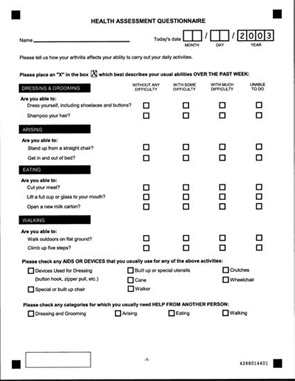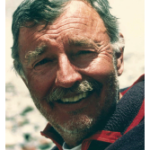Clearly, Dr. Fries keeps a full calendar. “I have never worked full time,” he responds, when queried about his schedule. “I have always worked more than full time. I figure if anything is worth doing, it’s worth overdoing.”
Pioneering Work
Dr. Fries is highly respected for his efforts in the field. Outcomes researcher Michael Ward, MD, MPH, an investigator at the National Institute of Arthritis and Musculoskeletal and Skin Diseases and The Rheumatologist board member, attests to Dr. Fries’ broad range of research interests. “If we talk about Jim Fries, the first thing that would come to [most] people’s minds is the HAQ,” says Dr. Ward, “But that, in fact, is just one segment of a whole notion of outcome assessment that includes measurement of a range of components.” (These are Disability, Discomfort or pain, Drug side effects, Dollars, and Death—the so-called Five Ds.) “His view is that if we are not measuring all of those components, then we have an incomplete picture of what is going on with a particular group of patients or a particular disease,” he says.
Dr. Fries praises the mentoring he received from older colleagues such as Drs. Holman and Shulman. “It was a form of mentoring where you had support provided, but it was really [provision of] some elbow room,” he says. Dr. Ward, currently a researcher at NIAMS, spent 12 years at Stanford, first as a fellow and trainee with Dr. Fries’ research group, and then as a faculty member. As a mentor, Dr. Fries is “more of a shaper than a director,” he says. “He is very good at recognizing people’s level of experience, letting them explore ideas, and giving them direction when they need it. That’s what I experienced and what I saw him doing with other trainees as well.”
Broad Range of Interests
In addition to his scientific achievements, which have yielded countless accolades (such as the ACR Lifetime Clinical Research Award and the first C. Everett Koop National Health Award), Dr. Fries is also a mountain climber, world traveler, and horseman. He and his wife Sarah have continued their trips despite her ongoing battle with metastatic melanoma.
“We declared ourselves on an extended honeymoon for the rest of our lives without concession to illness and have had wonderfully good times these last 500 days, punctuated only by periodic medical procedures,” he wrote in October for a Dorsey [Los Angeles] High School Class of 1956 Reunion profile. In the past year, his wife presented the Elizabeth A. Fries Health Education Award in Philadelphia, in honor of their daughter who tragically succumbed in 2005 to complications of chemotherapy for breast cancer. The couple has also endowed the James F. Fries Chair in Medicine at Johns Hopkins.

